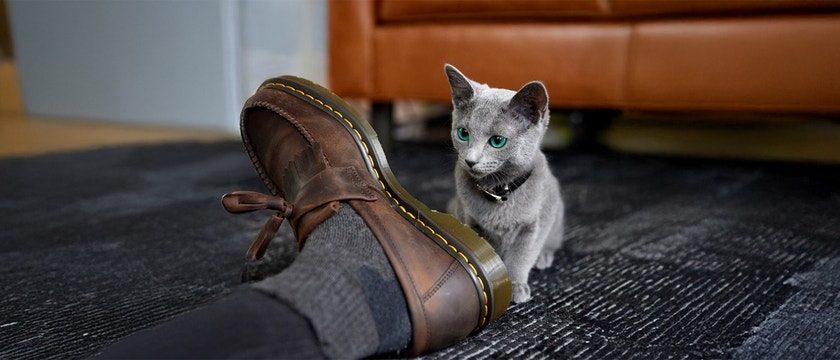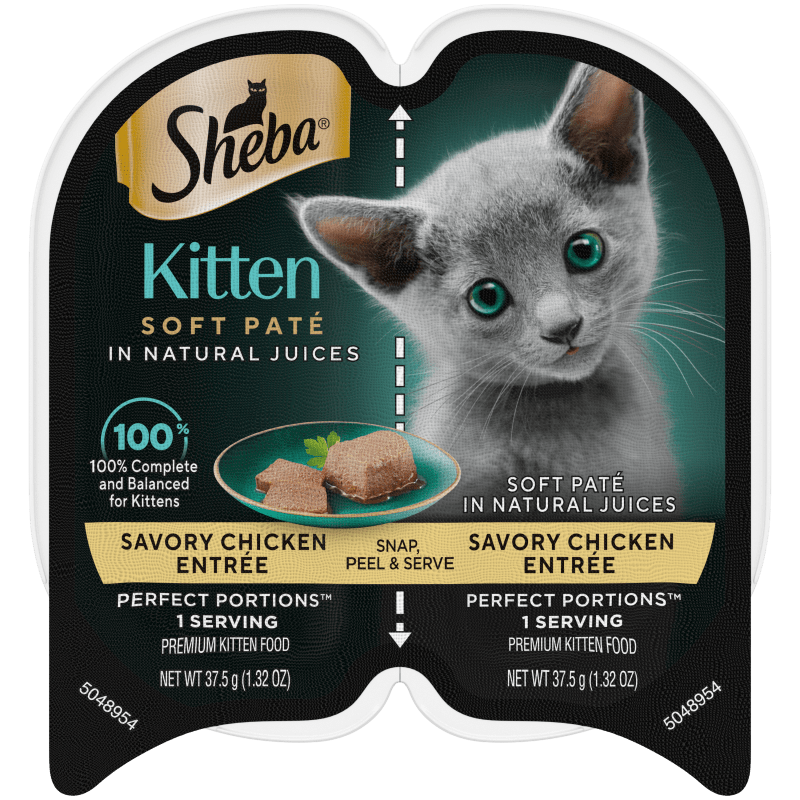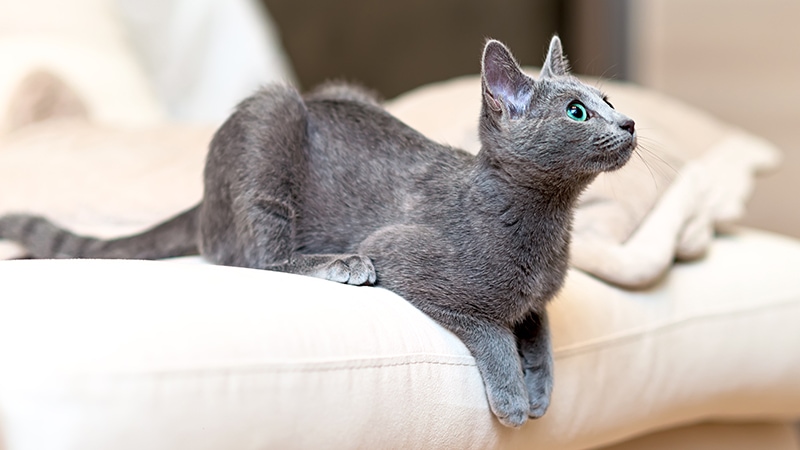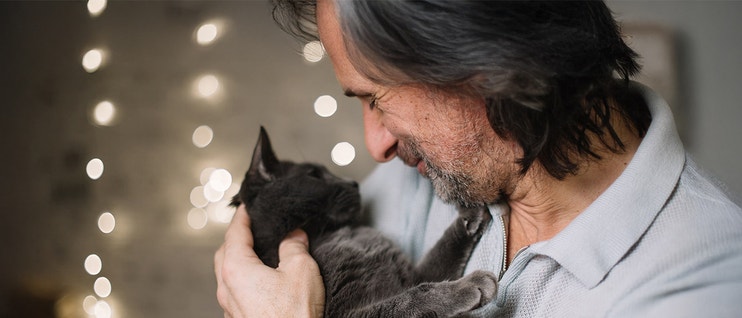
How To Take Care of a Kitten: Essential Care Tips
Good kitten care isn’t just lots of love and pets — although those things are important! Kittens have different, and often more, needs than their older counterparts, and that may seem daunting. But, once you get the basics down, you’ll find that it’s easier than you expected.
In this article, we discuss how to set up a routine of effective kitten care in order to help your favorite feline stay happy, healthy, and active.

Essential Steps of Kitten Care
Before you bring your furry friend home for the first time — or soon after they arrive — check these kitten care essentials off your list in order to give them the best start possible.
Prepare Your Home
Providing the best kitten care may require a bit of preparation and change on your part — particularly to your home. Kittens are especially curious, so they’ll likely get into everything (and we do mean everything!).
To keep them safe, get rid of or secure:
Poisonous plants
Household chemicals
Human food
Medications
Similarly, move or secure breakable and dangerous items such as lamps, shelves, bookcases, cords of all kinds, candles, and sharp objects (just to name a few).
If your cat lives exclusively indoors, you’ll also want to eliminate outdoor access as much as possible. Check that all window screens are tight in their frames and that all doors latch completely.
For more information on preparing your home for your new feline friend, check out these articles from the SHEBA® blog:
Table of Contents
Find a Vet
Regular vet visits are one of the best things you can do to help keep your kitten happy and healthy. Find a vet in your area, arrange for a visit, and be sure to ask about how to set up a schedule for check-ups, vaccinations, and other milestones in your cat’s life.
Get Your Kitten Vaccinated
Your kitten will need vaccinations to protect them from contagious diseases. When your kitten is between six and eight weeks old, arrange for a visit to the vet, who will assess your cat’s health and determine the best vaccination schedule.
Start the Socialization Process
Start socializing your kitten right away, even before they come home if possible.
Pick them up. Hold them. Get them used to their carrier. Introduce them to your children, your pets, and other members of your family.
Giving them plenty of exposure to a variety of situations, environments, and people will help them become more social(open in new tab) and prevent them from being nervous or skittish as they grow up.
Begin Litter Box Training
If your kitten lives indoors, it’s a good idea to start litter box training right away.
Most cats have a natural desire to dig and bury their waste(open in new tab), so they’ll likely take to litter box training quite quickly. To reinforce this behavior, reward your kitten with a treat or lots of pets when they use the litter box correctly.

When they’re first born, your kitten needs their mother’s milk as their sole source of nutrition. Between five and eight weeks old, you can start to gradually transition them into complete and balanced kitten-specific food (like SHEBA® PERFECT PORTIONS™ Soft Pate(open in new tab)).
Your kitten’s nutritional needs differ from those of older cats because newborns are growing and developing so quickly. Their body needs food with all the right vitamins, minerals, and essential nutrients to keep up.
If you’re transitioning your kitten from their mother’s milk to wet food, try mixing the kitten food with a complete and balanced milk replacement to ensure they have the right balance of nutrition for their age.
How Much to Feed Your Kitten
How much you feed your kitten will vary based on:
Breed
Activity level
Genetics
But, in general, kittens need about 250-280 calories per day.
Start by reading the package label of the food you choose for the recommended feeding guidelines. Then, talk to your vet for more details about your kitten’s nutritional needs and the best diet for their ideal body condition.
For example, if you’re feeding your kitten Sheba® Kitten Pate in either the chicken(open in new tab) or salmon(open in new tab) flavor, give them four to seven servings every day (adjusted as needed).
When to Feed Your Kitten
For the first six months of their life, kittens will need to eat several small meals frequently throughout the day. Until they turn five weeks old, they’ll get everything they need from their mother.
As we mentioned earlier, at five weeks you can start transitioning them into kitten-specific food, but they’ll still need to eat a lot of small meals. When your kitten is first switching from mother’s milk, try feeding them four to seven times per day.
Usually around six months, they’ll be able to handle more food at each feeding and will only want to eat twice a day.
Keep in mind that these are general guidelines. We always recommend consulting with your vet to establish the best kitten care possible.
Feeding Tips
Always Provide Fresh Water
No matter what you feed your kitten, always provide a source of fresh water. Typically, one bowl is enough for a single kitten for the entire day (with some left over). But, if you have more than one kitten, you may need to set out multiple bowls.
Change the water once a day, and wash the bowl every other day to prevent bacteria growth. If you feed your kitten outdoors, you may have to change their water and wash the bowl more often because it’s exposed to more dirt and debris.
Start with Wet Food
An easy and nutritious way to transition your kitten from mother’s milk to more solid food is to start with mixing wet food.
A complete and balanced wet food provides all the vitamins, minerals, and essential nutrients that your kitten needs to grow big and strong. In addition, wet food is easier for their little mouths and teeth to chew and provides moisture in their diet.
Be Careful When Transitioning Your Kitten to an Adult Diet
When your kitten is 10 to 12 months old, it’s time to start the switch to an adult diet. Choose adult cat food made with high-quality protein and other ingredients to ensure that your young cat gets the nutrition they need to thrive.
We recommend transitioning to SHEBA® PERFECT PORTIONS™ Premium Pate(open in new tab) and SHEBA® PERFECT PORTIONS™ Cuts in Gravy(open in new tab) because the flavor and texture are similar to the wet kitten food you’ve already been feeding your kitten every day.
Switching from wet kitten food to wet adult food makes the transition easier and more enjoyable for your growing cat.

The early days, weeks, and months of your kitten’s life are the perfect time to establish and build a bond. To do so, simply spend quality time with them!
That can look like holding them on your lap, petting and cuddling them while you watch TV or read a book, and brushing their soft fur.
Play with Your Kitten
One of the best ways to bond with your kitten and enrich their life is to play with them.
Use simple toys — like a piece of string or a ball on a stick — to engage their attention, stimulate their mind, and sharpen their instincts. If they’re in the mood, you can even chase them around the room.

Start as early as possible using positive reinforcement to teach your kitten good behavior and basic commands like “come,” “sit,” and “stay.”
We can’t guarantee that your kitten will always obey, but it can be a fun time for both you and your feline friend.
Provide a Scratching Post
Kittens like to scratch things. In fact, they need to scratch things! Scratching helps kittens keep their claws sharp and removes dead parts. Scratching also allows them to stretch their muscles and mark their territory (with the scent glands in their paws).
If you don’t provide a scratching post and train them to use it, your kitten is going to use whatever is most readily available — including your furniture, walls, and carpet!

Good Nutrition Is Important for Kitten Care
As a proud cat owner, you want to provide the best kitten care possible so your little bundle of fur and curiosity has the best chance at a happy, healthy life. Good nutrition is at the very center of that.
Make sure that the kitten food you feed them is made with high-quality ingredients(open in new tab) so they get the nutrition they need to grow big and strong.
We recommend SHEBA® Kitten Pate(open in new tab) because it’s nutritionally complete and specifically formulated for growing kittens. Our wet food for kittens comes in two delicious flavors — chicken(open in new tab) and salmon(open in new tab) — and is enriched with vitamins, minerals, and essential nutrients.
Remember, providing the best kitten care possible isn’t just about giving them what they need; it’s also about giving them what they want. And SHEBA is what cats want™.




